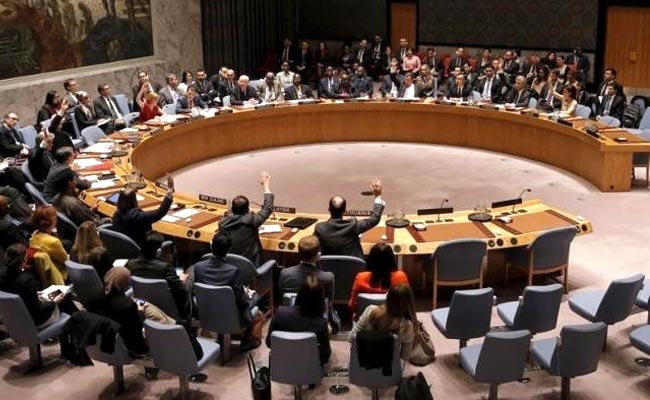
The leaders from spoke before Thursday's closed briefing to the Security Council by UN envoy to Libya Martin Kobler.
United Nations:
Britain, France and Russia on Thursday backed the new UN-brokered unity government in Libya and called for international support for its efforts to reunite and stabilize the deeply divided country.
Russia's UN Ambassador Vitaly Churkin said creating a central authority that can work effectively throughout the country is especially important "in light of the terrorist threat" and the presence of fighters from the ISIS terror, also known by the Arabic acronym Daesh.
Libya has been dominated by an array of militias since the 2011 uprising that toppled and killed longtime dictator Moammar Gadhafi.
Western nations view the new government, whose leader arrived in the capital Tripoli last week, as the best hope for ending Libya's chaos and uniting all factions against an increasingly powerful ISIS affiliate, which has seized the central city of Sirte.
Another government, based in the eastern city of Tobruk, still opposes the UN-backed body.
Churkin said "it's good that some progress has been made but the situation in the country ... continues to be nearly catastrophic."
The UN needs to continue working to make sure "there is maximum unity among various forces in the country," he said, noting that parliament hasn't yet approved the unity government and some influential groups of people remain opposed.
"They should gradually move, hopefully with the support of all the political forces, to reunite the country and to create a new central authority which will be effectively working throughout the country," Churkin said. "For the international community to help the Libyans fight this terrorist threat there must be central authorities."
France's UN Ambassador Francois Delattre said the unity government has a "historic opportunity" to create the conditions for stability "and roll back the chaos on which Daesh has thrived."
"Libyans must know ... that the international community stands behind them and will support them in their quest for stability," he stressed.
Britain's UN Ambassador Matthew Rycroft welcomed "the good news" that the head of the new government, Fayez Serraj, is now in Tripoli. He stressed the importance of "a step-by-step process" supported by the international community to accelerate the establishment of a stable and successful government.
"We don't want the future government of national accord to topple over before it's even started, so we'll be working very closely with it to make sure it has the support that it needs," Rycroft said.
The three ambassadors spoke before Martin Kobler, the UN envoy for Libya, briefed the Security Council behind closed doors by video link from neighboring Tunisia.
Two diplomats, speaking on condition of anonymity because the session was private, said Kobler was "cautiously optimistic" but stressed that the security situation remains fragile.
Kobler asked for more international support, they said.
The U.N. envoy said the main challenges include getting militias and all parties to support the unity government, organizing a peaceful handover of power, improving security, and addressing the critical humanitarian situation, the diplomats said.
Russia's UN Ambassador Vitaly Churkin said creating a central authority that can work effectively throughout the country is especially important "in light of the terrorist threat" and the presence of fighters from the ISIS terror, also known by the Arabic acronym Daesh.
Libya has been dominated by an array of militias since the 2011 uprising that toppled and killed longtime dictator Moammar Gadhafi.
Western nations view the new government, whose leader arrived in the capital Tripoli last week, as the best hope for ending Libya's chaos and uniting all factions against an increasingly powerful ISIS affiliate, which has seized the central city of Sirte.
Another government, based in the eastern city of Tobruk, still opposes the UN-backed body.
Churkin said "it's good that some progress has been made but the situation in the country ... continues to be nearly catastrophic."
The UN needs to continue working to make sure "there is maximum unity among various forces in the country," he said, noting that parliament hasn't yet approved the unity government and some influential groups of people remain opposed.
"They should gradually move, hopefully with the support of all the political forces, to reunite the country and to create a new central authority which will be effectively working throughout the country," Churkin said. "For the international community to help the Libyans fight this terrorist threat there must be central authorities."
France's UN Ambassador Francois Delattre said the unity government has a "historic opportunity" to create the conditions for stability "and roll back the chaos on which Daesh has thrived."
"Libyans must know ... that the international community stands behind them and will support them in their quest for stability," he stressed.
Britain's UN Ambassador Matthew Rycroft welcomed "the good news" that the head of the new government, Fayez Serraj, is now in Tripoli. He stressed the importance of "a step-by-step process" supported by the international community to accelerate the establishment of a stable and successful government.
"We don't want the future government of national accord to topple over before it's even started, so we'll be working very closely with it to make sure it has the support that it needs," Rycroft said.
The three ambassadors spoke before Martin Kobler, the UN envoy for Libya, briefed the Security Council behind closed doors by video link from neighboring Tunisia.
Two diplomats, speaking on condition of anonymity because the session was private, said Kobler was "cautiously optimistic" but stressed that the security situation remains fragile.
Kobler asked for more international support, they said.
The U.N. envoy said the main challenges include getting militias and all parties to support the unity government, organizing a peaceful handover of power, improving security, and addressing the critical humanitarian situation, the diplomats said.
Track Latest News Live on NDTV.com and get news updates from India and around the world

